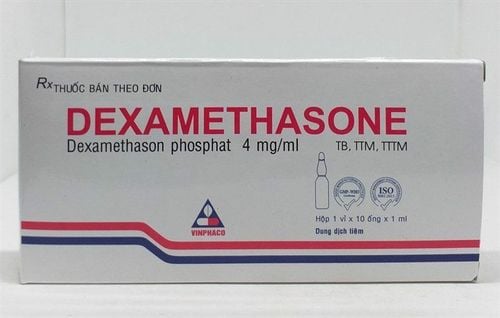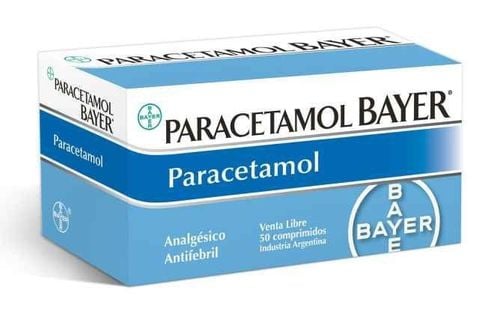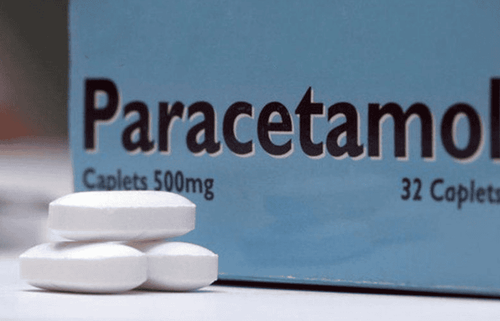This is an automatically translated article.
Pacemin medicine is often used in the treatment of fever, cold, runny nose, headache, toothache. So what is Pacemin drug, how to use this drug? And can Pacemin be used for babies?
1. What is Pacemin?
Pacemin belongs to the group of pain relievers (non-opioid) and antipyretic. The main ingredients in a packet of powder are:
Thiamine 10 mg Acetaminophen 325 mg Chlorpheniramine 2mg Acetaminophen is also known as paracetamol, this is a substance with analgesic - antipyretic effect. Paracetamol is effective in lowering body temperature in febrile patients, but rarely in normal subjects. This active substance acts on the hypothalamus to cause hypothermia, increase the exothermic process due to vasodilation and increase peripheral blood flow.
Chlorpheniramine has an antihistamine effect, has very little sedative effect. Like most antihistamines, chlorpheniramine also has the side effect of blocking acetylcholine secretion. The antihistamine effect of chlorpheniramine is based on competitive blocking of H1 receptors of effector cells.
Thiamin nitrate is a coenzyme that metabolizes carbohydrates.
Pacemin is indicated in the following cases:
Fever from mild to moderate. Cold, runny nose. Headache, toothache. Upper respiratory tract allergy. Pacemin is contraindicated in the following cases:
People with allergies, hypersensitivity to Paracetamol, Chlorpheniramine or any other ingredients in the drug. The patient has hepatocellular failure, narrow-angle glaucoma. The patient has an enlarged prostate gland. The patient has acute asthma attacks. The patient has bladder neck obstruction, pyloric obstruction. Women who are breastfeeding. Infants and premature infants. Patients with anemia, G6PD deficiency. Patient has heart, lung, liver, kidney disease. Patient has been taking an MAO inhibitor within the last 14 days. Thus, it is not possible to use Pacemin for infants and premature babies.
2. Dosage and how to use Pacemin
Pabemin drug has 2 dosage forms, powder and nuggets, both of which are taken orally. Before drinking, you need to dissolve the packet of powder or packet of nuggets with 1 cup of water, then stir to dissolve completely.
Dosage of Pacemin drug comply with the doctor's instructions, the reference dose is as follows:
For adults and children over 12 years old: Each time take 1-2 sachets, take 1 time every 4 to 6 hours, not recommended. drink more than 5 times in a day. For children from 6 to 12 years old: Take 1 pack each time, every 4 to 6 hours, take 1 time, not more than 5 packs within 1 day. Children under 6 years of age: Currently, the safety of Pacemin is not known for this subject. Therefore, before using Pacemin for children under 6 years old, you need to consult a doctor. If using Pacemin and the fever persists for more than 3 days or the fever is higher than 39.5 degrees Celsius, you should stop using the medicine.
3. Side effects of the drug Pabemin
Common side effects of Pacemin include:
Somnolence, sedation. Dry mouth . Less common side effects of Pacemin include:
Skin rash Nausea, vomiting. Neutropenia, leukopenia, pancytopenia, anemia. Kidney disease, nephrotoxicity when using Pacemin for a long time. Rare side effects of Pacemin include:
Hypersensitivity reactions. Dizziness Nausea In addition, Pacemin also has some serious side effects such as:
Stevens - Johnson syndrome Toxic epidermal necrolysis Acne, systemic erythema. These side effects are rare, but they are very dangerous and can lead to death. Therefore, if you experience any of the above conditions, you must stop taking Pacemin immediately and see a doctor so that it can be treated promptly.
4. Interaction of Pabemin with other drugs
Pacemin has the ability to increase the anticoagulant effect of coumarin and indandion derivatives when used in high doses for a long time. Concomitant administration of Pacemin with Phenothiazine or other antipyretic therapies in febrile patients may result in severe hypothermia. The use of Pacemin in alcoholic patients may increase the potential for hepatotoxicity. Concomitant use of Pacemin with drugs capable of activating hepatic microsomal enzymes such as phenytoin, barbiturates may increase drug metabolism into hepatotoxic substances, causing hepatotoxicity. Therefore, Pacemin should not be used concurrently with the above drugs. Another drug with the potential to increase hepatotoxicity when used concurrently with Pacemin is Isoniazid. Alcohol or sedatives that induce sleep may exacerbate the CNS depressant effects of Pacemin. Some drugs that can increase toxicity when used with Pabemin are: Phenytoin, Chloramphenicol. Above is all the important information about Pabemin. You need to read the instructions carefully before using and it is necessary to consult your doctor or pharmacist.
Please dial HOTLINE for more information or register for an appointment HERE. Download MyVinmec app to make appointments faster and to manage your bookings easily.













